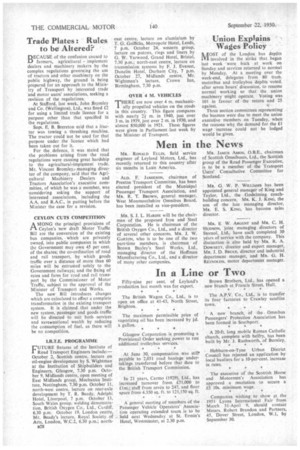Trade Plates : Rules to be Altered?
Page 62

If you've noticed an error in this article please click here to report it so we can fix it.
BECAUSE of the confusion caused to farmers, agricultural implement dealers and machinery makers by the complex regulations governing the use of tractors and other machinery on the
public highway, the ground is being -prepared for an approach to the Ministry of Transport by interested trade and motor users' associations, seeking a revision of the regulations. At Stafford, last week, John litromley and Co. (Wellington), Ltd., was fined £2 for using a limited trade licence for a purpose other than that specified in the regulations. Supt. E. B. Brereton said that a fractor was towing a threshing machine.
The tractor could not be used for that purpose under the licence which had been taken out for it.
For the defence, it was stated that The problems arising from the road regulations were causing great hardship to the agricultural-implement trade. Mr. Vincent Bromley,. managing direc tor of the company, said that the Agri cultural Machinery Dealers and Tractors Association's executive com mittee, of which he was a 'member, was 'considering asking the support of interested .associations, including the A.A. and R.A.C., in putting before the Minister the case for a revision.
CEYLON CUTS COMPETITION
A MONO the principal provisions of
Ceylon's new draft Motor Traffic Bill arc the conversion of the existing bus companies. • which are privately owned, into public companies in which the Government may own 45 per cent. of the shares; the co-ordination of road and rail transport, by which goods traffic over a distance of more than 60 miles will be entrusted solely to the Government railways; and the fixing of rates and fares for road and rail transport by the Commissioner of Motor Traffic, subject to the approval of the • Minister of Transport and Works. The new Bill introduces changes which are calculated to effect a complete transformation in the existing transport system. It is claimed that under the new system, passenger and goods traffic will be directed to suit both services and save•national wealth by reducing the consumption of fuel, as there will be no competition.
I.R.T.E. PROGRAMME
VUTURE fixtures of the Institute of Road Transport Engineers include:— October 2, Scottish centre, lecture on oil-engine development by S. Wightman at the Institution of Shipbuilders and Engineers, Glasgow, 7.30 p.m. October 9, Midlands centre, open meeting of East Midlands group, Mechanics Institute, Nottingham, 7.30 p.m. October 11, north-west centre, lecture on rear-axle development by T. R. Beady, Adelphi Hotel, Liverpool, 7 p.m. October 13, South Wales group, welding demonstration, British Oxygen Co., Ltd., Cardiff, 6.30 p.m. October 19. London centre, Mr. Beady's lecture, Royal Society. of Arts, London, W.C.2, 6.30 p.m.; north
B28
east centre, lecture on aluminium by T. U. Griffiths, Metropole Hotel, Leeds, 7 p.m. October 24, western group, lecture on pistons, rings and liners by G. W. Yarwood, Grand Hotel, Bristol, 7.30 p.m.; north-east centre, lecture on transmission systems by F. J. Everest, Dunelrn Hotel, Durham City, 7 p.m. October 27, Midlands" centre, Mr. Wightman's lecture, Crown Inn, Birmingham, 7.30 p.m.
OVER 4 M. VEHICLES
THERE are now over 4 m. mechanic,. ally propelled vehicles on the roads in this country. This figure compares with nearly 24 m. in 1940, just over 3 m. in 1939, just over 2 m. in 1530, and almost 850,000 in 1921. These figures were given in Parliament.last week by the Minister of Transport.




































































































































































































































































